- Title: Improving Coral Reef Restoration and Recruitment Using Native Herbivorous Crabs
- Principal Investigator: Mark Butler
- Funding Source: National Fish & Wildlife Foundation
- Timeline: 06/01/20–05/30/22
Florida’s coral reefs have reached a threshold whereby their resilience has been compromised, species are endangered, and ecosystem function degraded. There is a human cost too. Coral reef-associated tourism and fishing generate about $8billion per year and support more than 70,000 jobs in the Florida Keys alone.
A big contributor to reef degradation has been the phase-shift from coral to macroalgae dominance that has diminished coral health and recruitment.

The Caribbean King Crab (Maguimithrax spinosissimus) Photo Credit: A. Jason Spadaro
We are testing a novel, two-pronged approach to coral reef restoration: (1) improve reef habitat for corals and other species by transplanting native, herbivorous crabs onto reefs to graze and reduce macroalgae, and (2) then increase coral density on reefs through coral transplantation, to help rebuild coral spawning biomass.
Listen to NPR talk to Butler about how crabs are helping dying coral reefs survive or read this Miami Herald article about "reef goats" or this FIU News story about crabs cleaning house for corals.
You can also dive into additional research from Butler, like his work about spiny lobsters using social distancing.
Team
Principal Investigator
Mark J. Butler IV
Walter and Rosalie Goldberg Professor of Tropical Ecology and Conservation
mbutleri@fiu.edu
